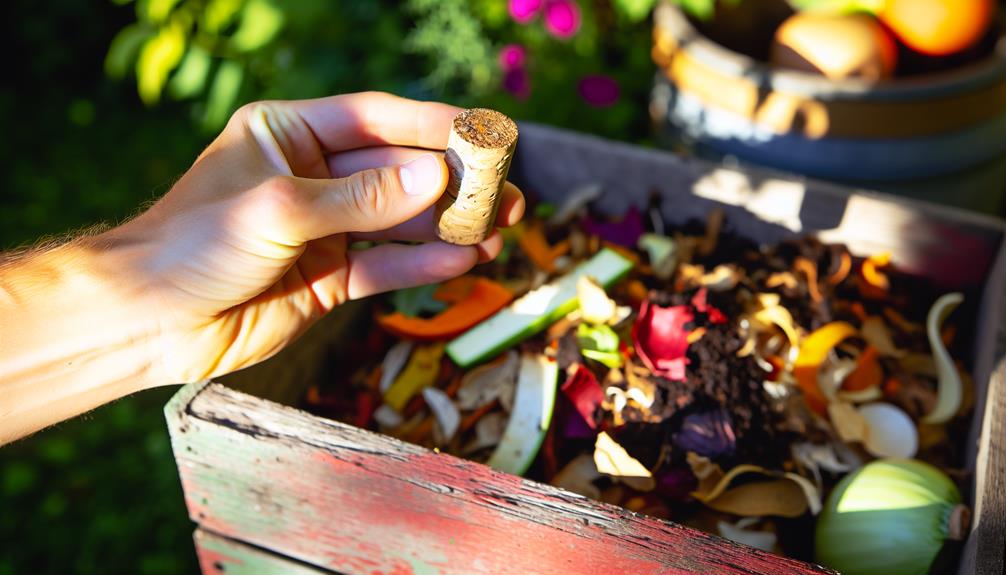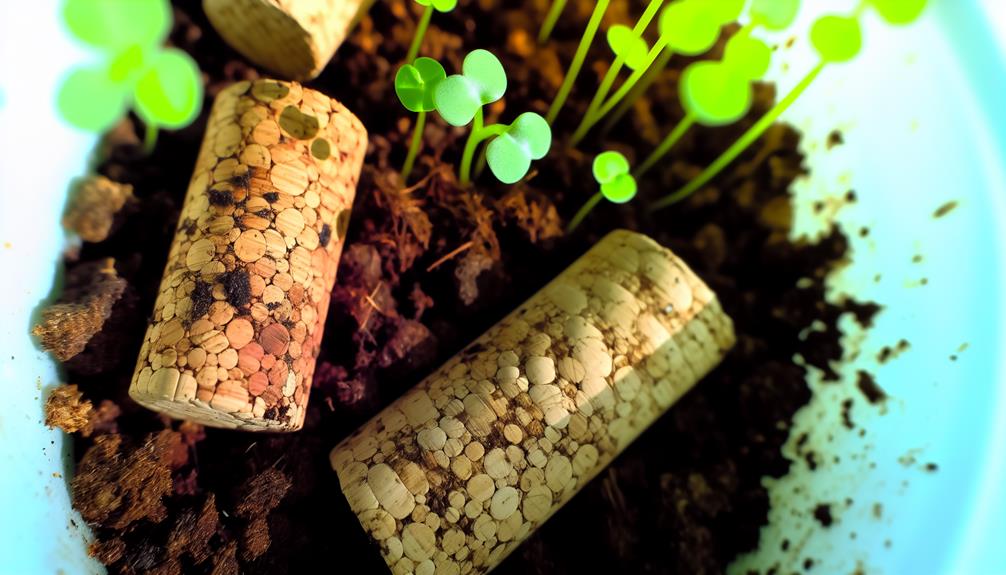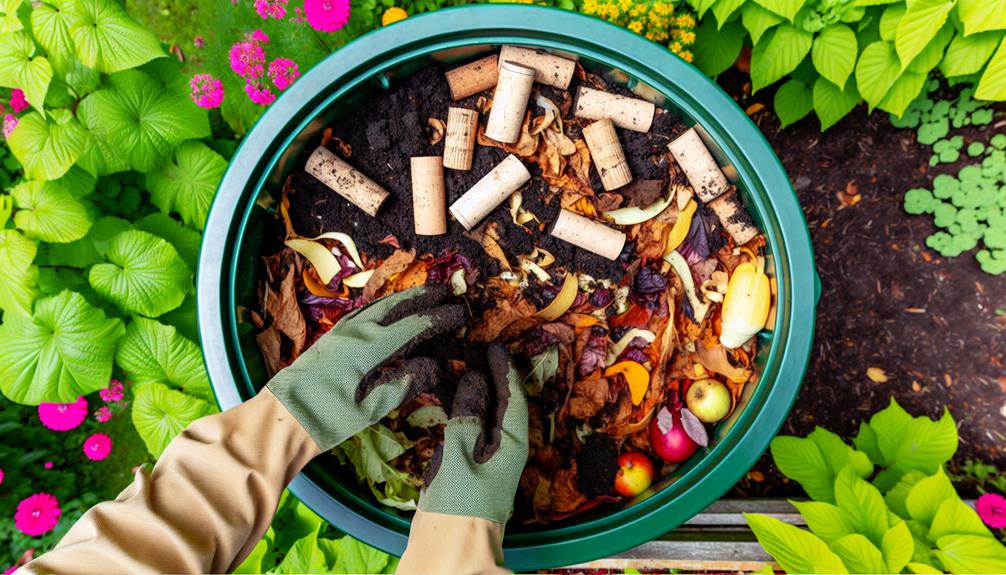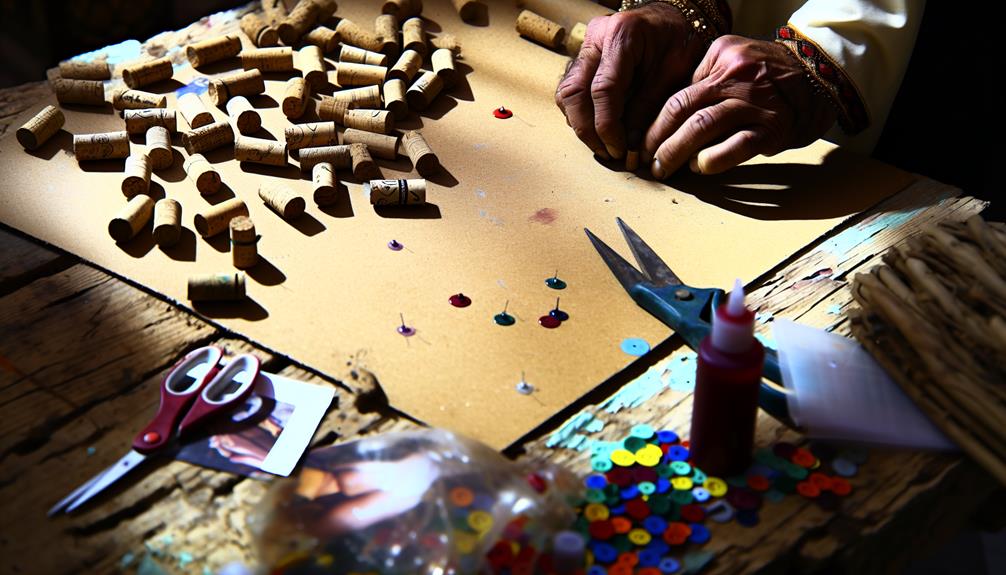

You can compost wine corks as long as they’re made from natural cork. Natural cork is biodegradable and renewable, enhancing your compost with nutrients. Before composting, clean the corks to remove any wine residue and chop them into smaller pieces to speed up decomposition. Make sure they aren’t synthetic, as synthetic corks are plastic-based and won’t break down.
Layer natural corks evenly within your compost pile, mixing them with other green and brown materials. This helps guarantee even decomposition. Properly composted corks can improve soil structure and retain moisture. Interested in more tips on composting and sustainable practices?
Wine corks generally come in two main types: natural cork and synthetic cork. Understanding these types will help you determine the best approach for composting.
Natural cork is made from the bark of the cork oak tree, primarily found in Mediterranean countries like Portugal and Spain. These cork materials are renewable and biodegradable, making them an environmentally friendly choice. The origins of natural cork trace back centuries, with traditional harvesting methods ensuring the trees aren’t harmed.
On the other hand, synthetic corks are made from plastic-based substances, designed to mimic the properties of natural cork. They’re often produced from petroleum-based materials, which means they’re not biodegradable. The origins of synthetic cork arose from a need to find an alternative to natural cork, especially to address issues like cork taint.
When handling wine corks, it’s essential to recognize the differences in cork materials and origins. This knowledge will guide you in making eco-conscious decisions. For instance, if you’re focused on sustainability, natural corks are a better choice. Knowing the type of cork you have can also help you decide whether it belongs in your compost pile or recycling bin.
Also Read: Can You Compost Black-Eyed Peas?
Knowing the differences between natural and synthetic corks is essential to making eco-friendly decisions for composting. Natural corks come from the bark of cork oak trees, primarily found in the Mediterranean. The harvesting method involves carefully stripping the bark without harming the tree, allowing it to regenerate. This process not only supports biodiversity but also maintains a renewable resource.
In contrast, synthetic corks are made from petroleum-based plastics or other polymers. They mimic the look and feel of natural cork but don’t share its eco-friendly properties. When considering composting, it’s vital to identify your cork type accurately.
Here’s a simple guide to help you distinguish between natural and synthetic corks:
Composting corks offers several environmental benefits, making it a valuable practice for eco-conscious individuals. When you compost wine corks, you’re participating in cork recycling, which helps reduce waste and support sustainable practices. Cork is a natural material that breaks down easily, enriching your compost with beneficial nutrients.

Using cork mulch in your garden is another excellent benefit. As the cork decomposes, it improves soil structure and retains moisture, which can be particularly helpful during dry spells. This can lead to healthier plants and a more efficient garden. Plus, cork mulch acts as a natural weed suppressant, reducing the need for chemical herbicides.
Also Read: Can You Compost Celery?
Before adding corks to your compost pile, you’ll need to make sure they’re natural and free from any synthetic materials or coatings. Natural corks are biodegradable, but synthetic ones can disrupt the composting process.
Once you’ve confirmed they’re natural, follow these steps to prepare them:
To start composting your prepared corks, you’ll first need to establish a balanced compost pile with the right mix of green and brown materials. Greens, like fruit scraps and coffee grounds, provide nitrogen, while browns, such as dry leaves and shredded cardboard, offer carbon. Your corks, being dry and woody, classify as brown materials.

Next, make sure your compost pile has the appropriate moisture levels. It should be as damp as a wrung-out sponge. Too much moisture can lead to anaerobic conditions, causing unpleasant odors and slowing decomposition. Conversely, a too-dry pile will hinder microbial activity, stalling the composting process.
Aeration needs are another crucial factor. Regularly turning your compost pile introduces oxygen, which is essential for aerobic decomposition. Use a pitchfork or compost aerator tool to mix the materials thoroughly. This not only provides oxygen but also helps break down the corks and other materials faster.
Layer the corks evenly within the pile, interspersing them with greens and other browns. This layering ensures that the corks don’t clump together, promoting even decomposition.
Also Read: Can You Compost Basil?
When composting wine corks, you might face a few issues. Watch out for chemical residues that could harm your compost.
Additionally, be aware that natural and synthetic corks break down at different rates, with synthetic ones posing more challenges.
One potential issue with composting wine corks is the presence of chemical residues from pesticides and preservatives. These chemicals are often used during the cork’s production process to guarantee longevity and prevent mold. When you compost wine corks, these residues can potentially leach into your compost, affecting its quality and safety. It’s crucial to understand the cleaning methods and chemical absorption properties of cork to effectively manage this issue.
Here are some considerations to keep in mind:
The breakdown timeframe of wine corks in compost can vary greatly, posing challenges for those seeking a consistent composting process. Factors such as moisture content and microbial activity play important roles in how quickly wine corks decompose.
If your compost pile is too dry, the corks will take longer to break down. On the other hand, maintaining adequate moisture content encourages microbial activity, accelerating decomposition.
To achieve a balanced compost pile, you should monitor and adjust the moisture levels regularly. Aim for a moisture level that feels like a damp sponge. If your compost pile is too wet, it can become anaerobic, slowing down the microbial activity essential for breaking down corks.
Another aspect to think about is the size of the cork pieces. Smaller pieces break down faster, so chopping or shredding corks before adding them to your compost can help.
Additionally, mixing the cork pieces with other organic materials like fruit and vegetable scraps can further enhance microbial activity, aiding the breakdown process.
However, composting synthetic corks presents its own set of challenges that can complicate the process. Unlike natural cork, synthetic corks are made from plastics and other non-biodegradable materials. This makes them unsuitable for traditional composting methods. Here are some key issues you might face:
To manage these issues, consider separating your synthetic corks and looking for specialized recycling programs. Some companies offer mail-in recycling options that can help you dispose of synthetic corks responsibly. By doing so, you contribute to a more sustainable and eco-friendly environment.
Also Read: Can You Compost Barbecue Sauce?
Beyond composting, wine corks can be repurposed in various creative ways to add a touch of sustainability to your everyday life. You can start by incorporating corks into craft projects. Create unique trivets, coasters, or even a bulletin board. Simply slice the corks into thin rounds or leave them whole, arranging them in a pattern that suits your style. These DIY projects not only reduce waste but also add a personalized touch to your home decor.

Another excellent use for wine corks is as garden mulch. By breaking them into smaller pieces, you can spread the cork fragments around your plants. Cork mulch helps retain soil moisture, suppresses weeds, and adds a natural look to your garden beds. Plus, it’s a biodegradable option that slowly decomposes, enriching the soil over time.
You can also use wine corks for practical household purposes. For instance, they make great drawer and cabinet bumpers to prevent slamming. Just slice them into thin discs and attach them to the inside corners of your drawers or cabinets. These simple yet effective uses for wine corks can help you contribute to a more sustainable lifestyle.
Also Read: Can You Compost Artichoke?
Reusing wine corks creatively isn’t just fun; it’s a step towards reducing your carbon footprint and minimizing environmental waste. When you think about the millions of wine corks discarded each year, it’s clear that small actions can make a big impact. By reusing or composting corks, you contribute to waste reduction and promote sustainability.
Here are four ways you can make a difference:
You’re wondering if colored wine corks can be composted. If they use natural dyes, go ahead. But, if they have synthetic colors, it’s better to avoid composting to keep your garden eco-friendly and safe.
Considering the current question, you’d be curious about the decomposition timeline for natural cork. Typically, natural cork takes 3-10 years to decompose, depending on environmental conditions. You’ll see it break down more quickly in a compost pile.
When composting corks, you might worry about cork chemicals or mold growth. Don’t stress too much. Natural corks usually pose minimal risk. Just make sure they’re clean and from untreated sources to keep your compost healthy and safe.
You can compost corks from sparkling wine bottles, but be sure they’re natural cork. Avoid composting plastic bottle caps, as they won’t break down. Embrace eco-friendly habits and join the community working towards a greener planet.
Composted corks don’t notably affect the soil’s pH level. Instead, they enhance soil aeration and boost microbial activity, making your garden healthier. Embrace this eco-friendly practice and join a community dedicated to sustainable living.
Composting wine corks is straightforward and eco-friendly. Stick to natural corks, as synthetic ones won’t break down.
Chop them into smaller pieces for faster decomposition. Add them to your compost pile, balancing with other organic materials. Watch for potential issues like slow breakdown or pests.
If composting isn’t feasible, repurpose corks creatively. By composting or reusing wine corks, you’re contributing to a healthier environment.
Now, you’re equipped to handle wine corks sustainably.
